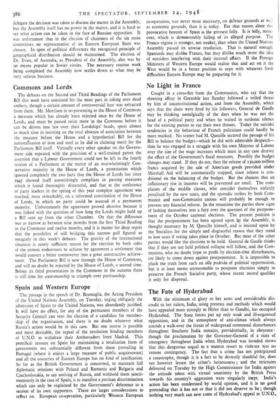Commons and Lords
The debates on the Second and Third Readings of the Parliament Bill this week have consisted for the most part in raking over dead embers, though a certain amount of controversial heat was extracted from them. Mr. Morrison in re-presenting to the House of Commons a measure which has already been rejected once by the House of Lords, and must be passed twice more in the Commons before it can be driven into law over their Lordships' heads, spent almost as much time in insisting on the total absence of association between the measure before the House and a hypothetical Bill for the nationafisation of iron and steel as he did in claiming merit for the Parliament Bill itself. Virtually every other speaker on the Govern- ment side repeated with the precision of a well-trained parrot the assertion that a Labour Government could not be left in the fourth session of a Parliament at the mercy of an overwhelmingly Con- servative majority in the House of Lords, a protestation which ignored completely the two facts that the House of Lords has since 1945 showed itself astonishingly compliant in passing measures which it found thoroughly distasteful, and that at the conference of party leaders in the spring of this year complete agreement was reached, most remarkably, on a reformed constitution of the House of Lords, in which no party could be assured of a permanent majority. Unfortunately the agreement proved abortive because it was linked with the question of how long the Lords might hold up a Bill sent up from the other Chamber. On that the difference was as narrow as between nine months from the first Third Reading in the Commons and twelve months, and it is matter for deep regret that the possibility of still bridging this narrow gulf figured so meagrely in this week's debates. The gravity of the international situation is surely sufficient reason for the exertion by both sides of the utmost endeavours to achieve by agreement a settlement that would convert a bitter controversy into a great constructive achieve- ment. The Parliament Bill is now through the House of Commons, and will no doubt be rejected by the House of Lords, a second time. Before its third presentation in the Commons in the autumn there is still time for statesmanship to triumph over partisanship.


































 Previous page
Previous page